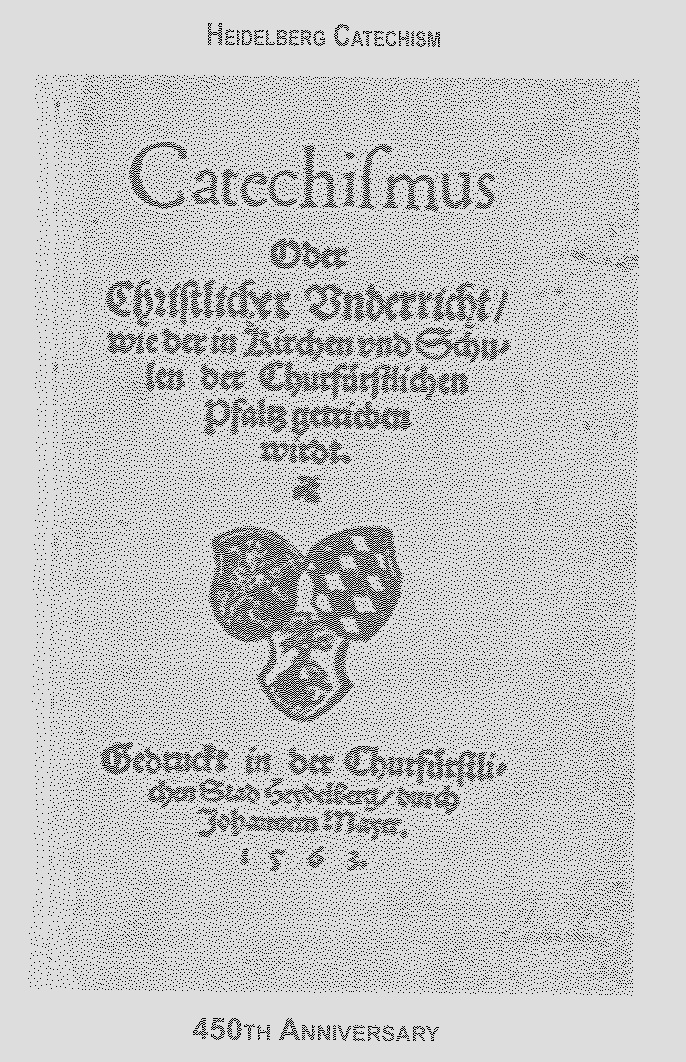The Heidelberg Catechism Key
.
.
By the Rev. Albert W. Kovacs
The Heidelberg Catechism Key
Jesus – fully satisfied for all my sins
Right in its very first answer lies the key that opens the door to understanding the revered catechism of Reformed churches throughout the world.
Question 1.
What is thy only comfort in life and in death?
That I, with body and soul, both in life and in death, am not my own, but belong to my faithful Savior Jesus Christ, who with his precious blood has fully satisfied for all my sins, and redeemed me from all the power of the Devil; and so preserves me that without the will of my Father in heaven not a hair can fall from my head, yea that all things must work together for my salvation. Wherefore, by his Holy Spirit He also assures me of eternal life and makes me heartily willing and ready henceforth to live unto him.
Zacharias Ursinus, scholarly author of the Heidelberg Catechism, tackled immediately the primary problem of the Reformation, to restore Jesus to his rightful place as the one by whom salvation comes. It is through his broken body on the cross and the blood from his pierced side, and this alone, that our redemption comes, which is the full satisfaction of God’s just punishment upon us for our sins, and without a single saving act of our own.
In Einsiedeln the young Swiss priest Ulrich Zwingli raised his voice against the practices of a Church that had become works oriented, in which salvation could be earned or bought. He protested practices like absolution for gifts of money, for decoration of the images in the churches, long pilgrimages and other denials or vows to pay for sins committed, or perhaps anticipated. At the same time a German monk, Martin Luther, was raising his own objections to similar abuses and corruption in the Church, and its offer of salvation by works.
Ursinus, in 1563, reflects the theme in Romans 3, “For no human being will be justified in his sight by works of the law,” (v.20), rather, “since all have sinned and fall shorty of the glory of God, they are justified by his grace as a gift, through the redemption which is in Christ Jesus.” (v.24-25).
Question 2
How many things are necessary for thee to know, that thou, enjoying this comfort, mayest live and die happily?
Three things: First, the greatness of my sins and misery. Second, how I am redeemed from all my sins and misery. Third, How I am to be thankful to God for such redemption.
The following questions deal with the misery of humankind, in recognition that we are “by nature prone to hate God and my neighbor . . . unless we are born again by the Spirit of God.” Because God is good and just, the evil brings condemnation and punishment, of the body for the doing and the soul for unrighteousness. Deserving temporal and eternal punishment, he asks what is required to escape punishment and find God’s favor again.
The twelfth question hints at the answer, asking what can we so – or anyone else. Since we continue to sin on a daily basis, and everyone else, it can’t be a human, and that leaves only Jesus, at the same time a true and sinless man and true God. It is by him alone that we are saved. “While we were yet helpless, at the right time Christ died for the ungodly.”
Looking back, at the greatness of our sin and misery, and the undeserved redemption by Jesus, what but a sense of greatest obligation should overwhelm our hearts, unless we be are thankless boors. The only response must surely be, how can – no, how must – we express our sincerest gratitude to the God who saves us. It is with relief and happy hearts that “we also rejoice in God through our Lord Jesus Christ, through whom we have now received our reconciliation.”
For people who live daily lives by the hours, this comes down to a question of just how do we show our happiness? Parents don’t need special gifts from their children. A crayon picture with stick figures and an expectant beaming face is more than adequate to show that their child is happy to be a part of their family, and warms the heart with immeasurable joy. In I Peter it says God’s ransom was not paid “with perishable things such as silver or gold, but with the precious blood of Christ, like that of a lamb without blemish or spot”(v.1:18-19). The trials we face every day prepare us for that Day when “the genuineness of your faith, more precious than gold . . . may redound to praise and glory and honor at the revelation of Jesus Christ” (v.1:7). Ursinus, like Zwingli, Calvin and Luther, instructs in the catechism that it is not even a mountain of works that will save us, but the Son of God. Peter calls forth, “you have tasted the kindness of the Lord. Come to him, to that living stone, rejected by men but in God’s sight chosen and precious; and like living stones be yourselves built into a spiritual house, to be a holy priesthood, to offer spiritual sacrifices acceptable to God through Jesus Christ” (v. 2:5).
.
Jesus, I live to Thee. The lovliest and best;
My life in Thee, Thy life in me,
In Thy blest love I rest.
Living or dying, Lord, I ask but to be Thine;
My life in Thee, Thy life in me,
Makes heaven forever mine.
.
Rev. Albert W. Kovacs
Central Classis — Calvin Synod
Ligonier, Pennsylvania
Comments are closed for this Article !


